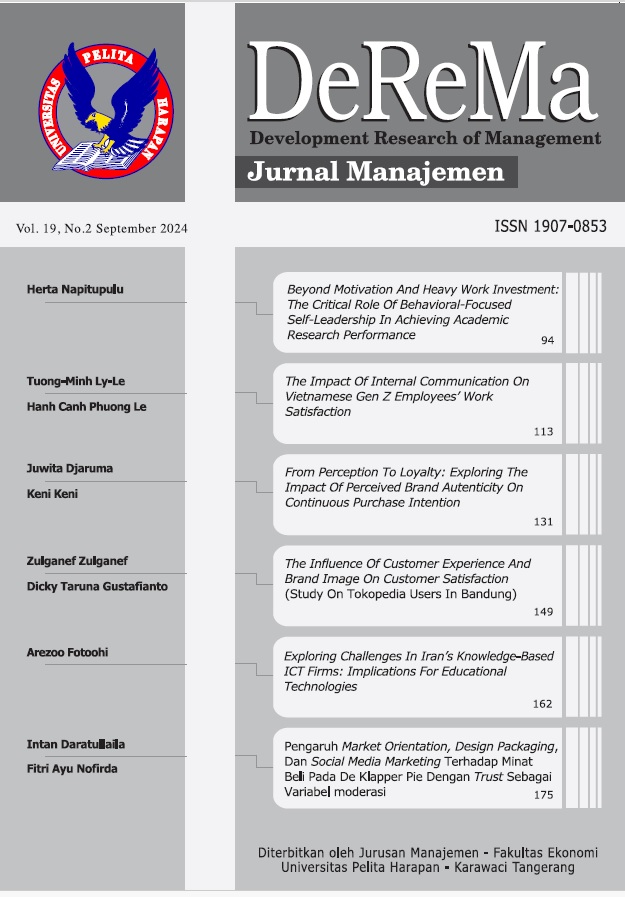FROM PERCEPTION TO LOYALTY: EXPLORING THE IMPACT OF PERCEIVED BRAND AUTHENTICITY ON CONTINUOUS PURCHASE INTENTION
DOI:
https://doi.org/10.19166/derema.v19i2.8546Keywords:
perceived brand authenticity, brand experience, continuous purchase intentionAbstract
Access to information has changed how consumers interact with brands, as they can learn more about a brand's authenticity, impacting their intention to repurchase the brand. Therefore, this study explores how perceived brand authenticity affects continuous purchase intention and examines the mediating role of brand experience. Authenticity was assessed on an instant noodle brand through three dimensions: heritage, quality commitment, and sincerity. The descriptive research used PLS-SEM for data analysis. Data were collected from 210 Generation Z consumers who had used the brand, selected via convenience sampling. The findings of this study underscore the importance of brand experience in mediating the relationship between brand authenticity and continuous purchase intention. Quality commitment and heritage positively and significantly influence brand experience but do not directly affect continuous purchase intention. Conversely, sincerity positively and significantly influenced brand experience and continuous purchase intention. The brand experience itself also significantly influences continuous purchase intention. Thus, brands should leverage their authenticity to enhance customer experience, boosting continuous purchase intention. This research offers valuable insights into brand management and consumer behavior, providing practical implications for creating effective brand strategies.
Abstrak dalam Bahasa Indonesia
Akses terhadap informasi telah mengubah cara konsumen berinteraksi dengan merek, karena mereka dapat mempelajari lebih banyak tentang keaslian merek, yang berdampak pada keterlibatan mereka dan niat untuk membeli kembali merek tersebut. Oleh karena itu, penelitian ini mengeksplorasi bagaimana persepsi keaslian merek mempengaruhi niat pembelian berkelanjutan dan mengkaji peran mediasi dari pengalaman merek. Keaslian dinilai pada merek mi instan melalui tiga dimensi: komitmen kualitas, warisan, dan ketulusan. Penelitian deskriptif ini menggunakan Partial Least Square-Structural Equation Modeling untuk analisis data. Data dikumpulkan dari 210 konsumen Generasi Z yang telah menggunakan merek tersebut, dipilih melalui convenience sampling. Temuan dari penelitian ini menekankan pentingnya pengalaman merek dalam memediasi hubungan antara keaslian merek dan niat pembelian berkelanjutan. Komitmen kualitas dan warisan secara positif dan signifikan mempengaruhi pengalaman merek tetapi tidak secara langsung mempengaruhi niat pembelian berkelanjutan. Sebaliknya, ketulusan secara positif dan signifikan mempengaruhi pengalaman merek dan niat pembelian berkelanjutan. Pengalaman merek itu sendiri juga secara signifikan mempengaruhi niat pembelian berkelanjutan. Dengan demikian, merek harus memanfaatkan keaslian mereka untuk meningkatkan pengalaman pelanggan, sehingga meningkatkan niat pembelian berkelanjutan. Penelitian ini memberikan wawasan berharga tentang manajemen merek dan perilaku konsumen, memberikan implikasi praktis untuk menciptakan strategi merek yang efektif.
References
Akdeniz, M. B., Calantone, R. J., & Vorhees, C. M. (2014). Signaling quality: An examination of the effects of marketing and nonmarketing-controlled signals on perceptions of automotive brand quality. Journal of Product Innovation Management, 31(4), 728-743. https://doi.org/10.1111/jpim.12120
Annur, C. M. (2023). Indomie, merek mi instan yang paling banyak dikonsumsi masyarakat indonesia setahun terakhir. Retrieved August 11, 2023, from https://databoks.katadata.co.id/datapublish/2023/02/17/indomie-merek-mi-instan-yang-paling-banyak-dikonsumsi-masyarakat-indonesia-setahun-terakhir
Astrachan, C. B., Botero, I. C., Astrachan, J. H., & Prugl, R. (2018). Branding the family firm: A review, integrative framework proposal, and research agenda. Journal of Family Business Strategy, 9(1), 3-15. https://doi.org/10.1016/j.jfbs.2018.01.002
Bougie, R. & Sekaran, U. (2020). Research methods for business: A skill building approach (8th ed.). New Jersey: John Wiley & Sons.
Chinomona, R. (2016). The Influence of brand trust, brand familiarity and brand experience on brand attachment: A case of consumers in the gauteng province of south africa. Journal of Economics and Behavioral Studies, 8(3), 79-91. https://doi.org/10.21580/jdmhi.2021.3.1.7440
Cynthia, C. & Keni, K. (2023). Brand experience, perceived value, and social media marketing to predicate brand loyalty. International Journal of Application on Economics and Business, 1(1), 402-408. https://doi.org/10.24912/ijaeb.11.402-408
Dion, D. & Mazzalovo, G. (2016). Reviving Sleeping Beauty brand by rearticulating brand heritage. Journal of Business Research, 69(12), 5894-5900. https://doi.org/10.1016/j.jbusres.2016.04.105
Euromonitor. (2019). 2019 megatrends: State of play. Retrieved august 22, 2023, from https://go.euromonitor.com/white-paper-consumers-2019-megatrends-state-of-play.html
Gazi, Md. A., Mamun, A. A., Masud, A. A., Senathirajah, A. R., & Rahman, T. (2024). The relationship between CRM, knowledge management, organization commitment, customer profitability and customer loyalty in telecommunication industry: The mediating role of customer satisfaction and the moderating role of Brand Image. Journal of Open Innovation: Technology, Market, and Complexity, 10(1), 100227. https://doi.org/10.1016/j.joitmc.2024.100227
Good Stats. (2023). Diekspor ke banyak negara, Indomie masuk daftar merek terpopuler di dunia 2021. Retrieved August 15, 2023, from https://goodstats.id/article/diekspor-ke-banyak-negara-indomie-masuk-daftar-merek-terpopuler-di-dunia-2021-1AoXA.
Hair, J. F., Black, W. C., Babin, B. J., & Anderson, R. E. (2019). Multivariate data analysis. London: Pearson Education.
Hair, J. F., Hult, G. T. M., Ringle, C. M., Sarstedt, M., Danks, N. P., & Ray, S. (2021). Partial Least Squares Structural Equation Modeling (PLS-SEM) using R. New York: Springer. https://doi.org/10.1007/978-3-030-80519-7
Hair, J. F., Sarstedt, M., Hopkins, L., & Kuppelwieser, G. V. (2014). Partial least squares structural equation modeling (PLS-SEM): An emerging tool in business research. European Business Review, 26(2), 106-121. https://doi.org/10.1108/EBR-10-2013-0128
Heider, F. (1958). The Psychology of interpersonal relations. New York: John Wiley & Sons. https://doi.org/10.1037/10628-000
Hernandez-Fernandez, A. & Lewis, M. C. (2019). Brand authenticity leads to perceived value and brand trust. European Journal of Management and Business Economics, 28(1), 222-238. https://doi.org/10.1108/EJMBE-10-2017-0027
Jimenez-Barreto, J., Rubio, N., & Campo, S. (2020). Destination brand authenticity: What an experiential simulacrum! a multigroup analysis of its antecedents and outcomes through official online platforms. Tourism Management, 77, 104-119. https://doi.org/10.1016/j.tourman.2019.104022
Keller, K. L. (1993). Conceptualizing, measuring, and managing customer-based brand equity. Journal of Marketing, 57(1), 1-22. http://dx.doi.org/10.2307/1252054
Kelley, H. H. (1973). The processes of causal attribution. American Psychologist, 28(2), 107-128. https://doi.org/10.1037/h0034225
Khan, I. & Fatma, M. (2017). Antecedents and outcomes of brand experience: An empirical study. Journal of Brand Management, 24(5), 439-452. https://doi.org/10.1057/s41262-017-0040-x
Khan, I., & Fatma, M. (2021). Online destination brand experience and authenticity: Does individualism-collectivism orientation matter? Journal of Destination Marketing & Management, 20, 100597. https://doi.org/10.1016/j.jdmm.2021.100597
Kompas. (2023). Produk lokal kian terpukul barang impor. Retrieved August 21, 2023, from https://www.kompas.id/baca/ekonomi/2023/08/14/semakin-merebak-barang-jadi-impor-dijual-murah-di-platform-daring
Lariviere, B., Keiningham, T. L., Cooil, B., Aksoy, L., & Malthouse, E. (2014). A longitudinal examination of customer commitment and loyalty. Journal of Service Management, 25(1), 75-100. https://doi.org/10.1108/JOSM-01-2013-0025
Lehman, D. W., O’Connor, K., Kovacs, B., & Newman, G. E. (2018). Authenticity. Academy of Management Annals, 13(1), 1-42. https://doi.org/10.5465/annals.2017.0047
Liu, X., Zhang, C., & Wu, J. (2023). Explaining consumers’ continuous purchase intention toward subscriber-based Knowledge Payment Platforms: Findings from PLS-SEM and fsQCA. Aslib Journal of Information Management, 76(2), 189-211. https://doi.org/10.1108/ajim-08-2022-0359
Liu, Y., Hultman, M., Eisingerich, A. B., & Wei, X. (2020). How does brand loyalty interact with tourism destination? Exploring the effect of brand loyalty on place attachment. Annals of Tourism Research, 81, 102879. https://doi.org/10.1016/j.annals.2020.102879
Mehta, A., Gaur, L., & Singh, G. (2022). Impact of Customer Experience on Attitude and Repurchase Intention in Online Grocery Retailing: A Moderation Mechanism of Value Co-Creation. Journal of Retailing and Consumer Services, 64(1), 102798. https://doi.org/10.1016/j.jretconser.2021.102798
Morhart, F., Malar, L., Guevremont, A., Girardin, F., & Grohmann, B. (2015). Brand authenticity: An integrative framework and measurement scale. Journal of Consumer Psychology, 25(2), 200-218. https://doi.org/10.1016/j.jcps.2014.11.006
Mostafa, R. B. & Kasamani, T. (2021). Brand experience and brand loyalty: Is it a matter of emotions? Asia Pacific Journal of Marketing and Logistics, 33(4), 1033-1051. https://doi.org/10.1108/APJML-11-2019-0669
Murshed, F., Dwivedi, A., & Nayeem, T. (2023). Brand authenticity building effect of brand experience and downstream effects. Journal of Product & Brand Management, 32(7), 1032-1045. https://doi.org/10.1108/JPBM-02-2021-3377
Napoli, J., Dickinson, S. J., Beverland, M. B., & Farrelly, F. (2014). Measuring consumer-based brand authenticity. Journal of Business Research, 67(6), 1090-1098. https://doi.org/10.1016/j.jbusres.2013.06.001
Napoli, J., Dickinson, S., & Beverland, M. B. (2016). The brand authenticity continuum: Strategic approaches for building value. Journal of Marketing Management, 32(13-14), 1-29. https://doi.org/10.1080/0267257X.2016.1145722
Ong, C. H., Lee, H. W., & Ramayah, T. (2018). Impact of brand experience on loyalty. Journal of Hospitality Marketing and Management, 27(7), 755-774. https://doi.org/10.1080/19368623.2018.1445055
Ong, C. H., Salleh, S. M., & Yusoff, R. Z. (2015). Influence of brand experience on loyalty dimensions: Evidence from successful Malaysian SME Brands. International Journal of Business and Commerce, 4(7), 51-75.
Panyekar, A. & Marsasi, E. G. (2024). The role of brand equity, brand authenticity, brand trust to increase customer satisfaction. Jurnal Pendidikan Ekonomi dan Kewirausahaan, 8(1), 71-89. https://doi.org/10.29408/jpek.v8i1.25144
Papadopoulou, C., Vardarsuyu, M., & Oghazi, P. (2023). Examining the relationships between brand authenticity, perceived value, and brand forgiveness: The role of cross-cultural happiness. Journal of Business Research, 167, 114154. https://doi.org/10.1016/j.jbusres.2023.114154
Qi, Y. & Yon, Y. (2020). Influence of multi-channel integration service quality on purchase intention of customers: Dual mediating effect of brand experience and brand trust. Revista Argentina de Clinica Psicologica, 29(2), 58-72. https://doi.org/10.24205/03276716.2020.207
Rather, R. A., Rasul, T., Khan, H., & Khan, I. (2024). Unveiling the dynamics between consumer brand engagement, experience, and relationship quality towards luxury hotel brands: Moderating investigation of brand reputation. International Journal of Hospitality Management, 116, 103572. https://doi.org/10.1016/j.ijhm.2023.103572
Rixom, J. M. & Rixom, B. A. (2023). Perceived brand authenticity: Examining the effects of inferred dedication and anticipated quality on consumers’ purchase intentions and actual choices. Journal of Consumer Behaviour, 22(3), 721-737. https://doi.org/10.1002/cb.2156
Rose, E. M., Rose, G. M., & Merchant, A. (2017). Is old gold? how heritage ”˜Sells’ the university to prospective students: The impact of a measure of brand heritage on attitudes toward the university. Journal of Advertising Research, 57(3), 335-351. https://doi.org/10.2501/JAR-2017-038
Roushdy, A. S. (2015). The relationship between consumer-based brand authenticity and brand loyalty: A mediating role of brand satisfaction. The Journal of Accounting, Management, and Insurance, 1-15.
Safeer, A. A., He, Y., & Abrar, M. (2020). The influence of brand experience on brand authenticity and brand love: An empirical study from asian consumers’ perspective. Asia Pacific Journal of Marketing and Logistics, 33(5), 1123-1138. https://doi.org/10.1108/apjml-02-2020-0123
Safeer, A. A., He, Y., Lin, Y., Abrar, M., & Nawaz, Z. (2023). Impact of perceived brand authenticity on consumer behavior: An evidence from generation Y in Asian perspective. International Journal of Emerging Markets, 18(3), 685-704. https://doi.org/10.1108/IJOEM-09-2020-1128
Statista. (2023). Food brand preference in Indonesia 2022, by Penetration Rate. Retrieved July 31, 2023, from https://www.statista.com/statistics/1346815/indonesia-penetration-rate-of-preferred-food-brands/
Steffen, A., Stettler, J., & Huck, L. (2021). Feeling (Un)welcome in Switzerland: The perception of commercial hospitality by domestic and international tourists. Tourism and Hospitality Research, 21(1), 44-60. https://doi.org/10.1177/1467358420944458
Sugiyono. (2021). Metode penelitian kuantitatif kualitatif dan R&D (2nd ed.). Bandung, Indonesia: Alfabeta.
Sung, K. S., & Lee, S. (2023). Customer brand co-creation behavior and brand sincerity through CSR interactivity: The role of psychological implications in service-dominant logic. International Journal of Hospitality Management, 108, 103388. https://doi.org/10.1016/j.ijhm.2022.103388
Taheri, B., Gannon, M. J., & Kesgin, M. (2020). Visitors’ perceived trust in sincere, authentic, and memorable heritage experiences. The Service Industries Journal, 40(9-10), 705-725. https://doi.org/10.1080/02642069.2019.1642877
Veronica, H. & Keni. (2022). Pengaruh kepuasan, word-of-mouth, dan perceived usefulness terhadap Intensi membeli kembali produk kecantikan merek lokal di Jakarta. Jurnal Manajemen Bisnis dan Kewirausahaan, 6(6), 594-599. https://doi.org/10.24912/jmbk.v6i6.20661
Wang, J., Tao, J., & Chu, M. (2020). Behind the label: Chinese consumers’ trust in food certification and the effect of perceived quality on purchase intention. Food Control, 108, 106825. https://doi.org/10.1016/j.foodcont.2019.106825
Xu, Y., Liu, C., Wei, F., Zhao, S., & Mao, H. (2024). The influence of government subsidies on remanufacturers’ production decisions, considering product quality, customer purchase intention, and carbon emissions. Journal of Cleaner Production, 443, 141130. https://doi.org/10.1016/j.jclepro.2024.141130
Zhang, M., Guo, X., Guo, X., & Jolibert, A. (2023). Consumer purchase intention of intangible cultural heritage products (ICHP): Effects of cultural identity, consumer knowledge and manufacture type. Asia Pacific Journal of Marketing and Logistics, 35(3), 726-744. https://doi.org/10.1108/APJML-11-2021-0831
Downloads
Published
Issue
Section
License
Authors who publish with this journal agree to the following terms:
1) Authors retain copyright and grant the journal right of first publication with the work simultaneously licensed under a Creative Commons Attribution License (CC-BY-SA 4.0) that allows others to share the work with an acknowledgement of the work's authorship and initial publication in this journal.
2) Authors are able to enter into separate, additional contractual arrangements for the non-exclusive distribution of the journal's published version of the work (e.g., post it to an institutional repository or publish it in a book), with an acknowledgement of its initial publication in this journal.
3) Authors are permitted and encouraged to post their work online (e.g., in institutional repositories or on their website). The final published PDF should be used and bibliographic details that credit the publication in this journal should be included.





